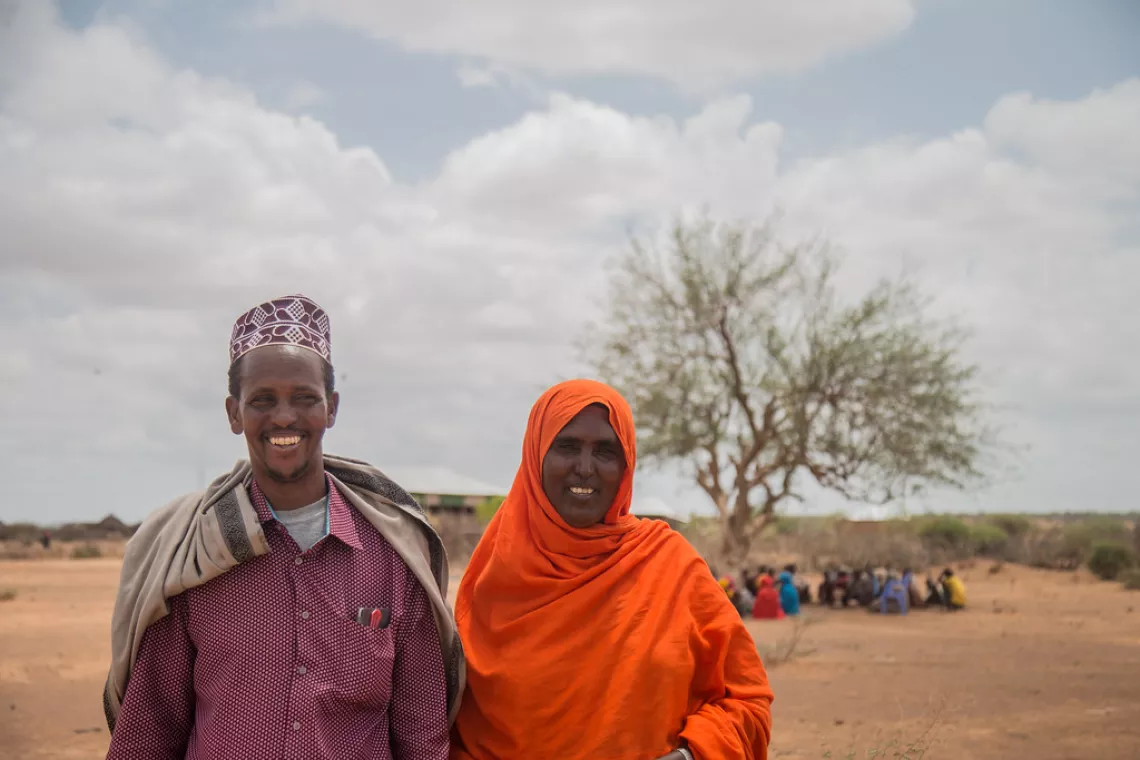Community engagement to abandon Female Genital Mutilation
Demberweyne Kebele, Danan Woreda, Somali region

Community conversation in Demberweyne kebele (sub-district), Danan Woreda (district) of the Somali Region of Ethiopia. The conversation brings men and women together to discuss Female Genital Mutilation (FGM) and other harmful practices prevalent in the area.

The discussions have taken place since 2016 and the community has shown change in reducing Female Genital Mutilation, as reflected by Diib Haybe, a community conversation member. “I have been a member for the past four years and I do remember how suspicious I was when I started coming to the community conversation.
Until recently, we were using the needle to sew close our girls after cutting their female genitalia. The community conversation taught many of us about the consequences of FGM and the community has shown a lot of progress. There are no circumcisers in our area. We report if we see and/or hear anything related to cutting or cutting arrangements which is against what we discuss here.”


“The religious leaders are helping us understand it better because many think that FGM is a religious obligation. My husband is one of the religious leaders here and he is the one who taught me to not circumcise my daughter. He teaches here at the community conversation. He highly encourages me to participate in the dialogue regularly and I do not miss any session. So, we always come here together.” Says Diib, photographed here with her husband Sheikh Abdi Seben, Facilitator of Community Conversation.
“My wife was ready to have our daughter circumcised but I refused. I have been teaching about this and I should practice what I teach. The community conversation is something I always look forward to and I only miss it if I am not in town. If there are any circumcisers found practicing, they will pay 50 camels to the girl and the families will be taken to court."
“FGM has been practiced for many years and I know that it will not be changed easily. However, we will continue sharing the religious perspectives on the practice of FGM that it is not a religious practice and it is a human rights violation which affects the wellbeing of women and girls”. A very happy Sheikh Abdi, says.

In addition to the community conversations, Adolescent Girls’ Group are trained by the Denan Woreda Bureau of Women, Children and Youth on causes and consequences of harmful practices and life skills, including decision making, interpersonal and communication skills. This group is formed of adolescent girls from Demberweyne Kebele, to create an opportunity for them to openly speak their mind and discuss FGM and child marriage and how they can protect themselves and others from these harmful practices. The aim is to enhance their capacity and engagement as change agents in their communities through peer education. The trained girls in turn reach other fellow adolescent girls, cascade the skills and information they have learned and facilitate discussions.

Nimo Hire, 20 years old, and Gordo Farah, 18, are best friends and strong advocates to stop the practice of FGM in their school and community. They first learned about FGM when the Woreda Bureau of Women, Children and Youth had an awareness raising day in 2016 at their school. Nimo remembers the first time she heard about FGM, “I was very ignorant about the issue and I was so shocked to learn about the consequences of FGM that day. I thought it was natural for every girl to be cut.” In Danan Woreda, FGM is performed in line with tradition and social norms to ensure that girls are socially accepted and marriageable, and to uphold their status and honour as well as their families.

Nimo joined the Adolescent Girls Group in her kebele immediately after she learned about the issue and started sharing with her peers and community about the consequences of FGM. Here she is pictured while facilitating the discussions in her group. In their discussions, they raise the negative effects of FGM and child marriage on the physical, sexual and psychological well-being of girls and women including the excessive bleeding, pain and long-term damage on reproductive health complications.
The Adolescent Girls Group discussion is now bringing more girls for open discussions. Nimo hopes that there will be more girl advocates who are dedicated to ending FGM. Nimo and her friends are committed to challenging their community.
Fartun Adan, Head of the Danan Woreda Bureau of Women, Children and Youth, says “These programmes are supporting around 8 Kebeles and there is visible change in our community. We used to have cases where families are caught while trying to escape to rural areas to practice FGM. But there are no recent cases and we have progressed with a strong follow-up and tracking mechanism. It is a great success as the communities are reporting these cases.”
The Programmes are implemented with the support of the UNICEF Luxembourg National Committee on accelerating action to end FGM in Ethiopia. In addition to being implemented in Afar, the programme is currently implemented in 64 kebeles across eight woredas (Gode, Danan, Kabridahar, Shaygosh, Wardher, Daratole, Fik and Hamaro woredas) of the Somali Region, Demberweyne Kebele being one of the kebeles.
“The Adolescent Girls Group is something we shouldn’t undermine. They discuss not only FGM but child marriage as well. The influence those girls have on their peers is very powerful. The biggest challenge is the unreached areas. We empower our communities but if there is a gap in other areas, communities can be pressured to travel there and abide to the norm supporting the practice. We need to work in every Kebele if we want to see a complete change.





